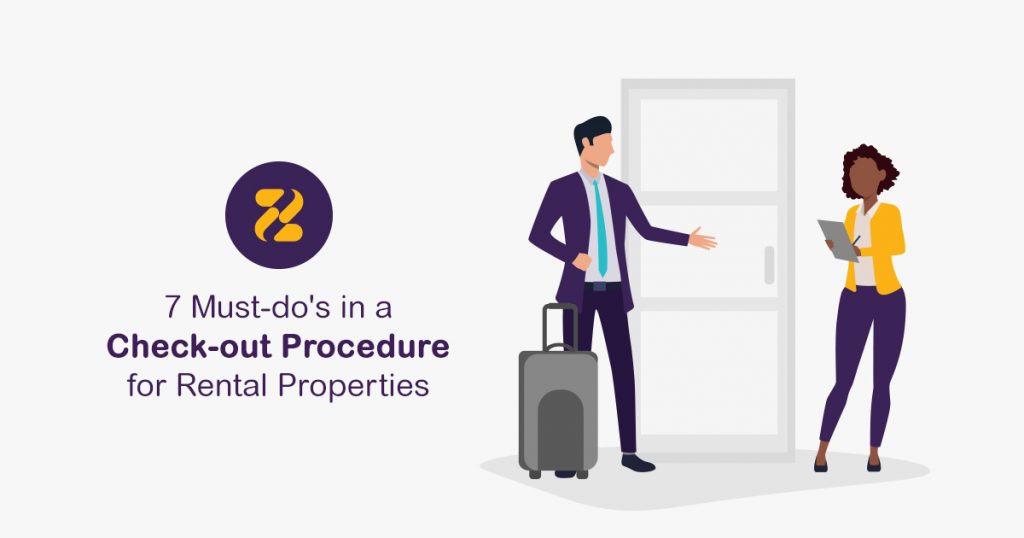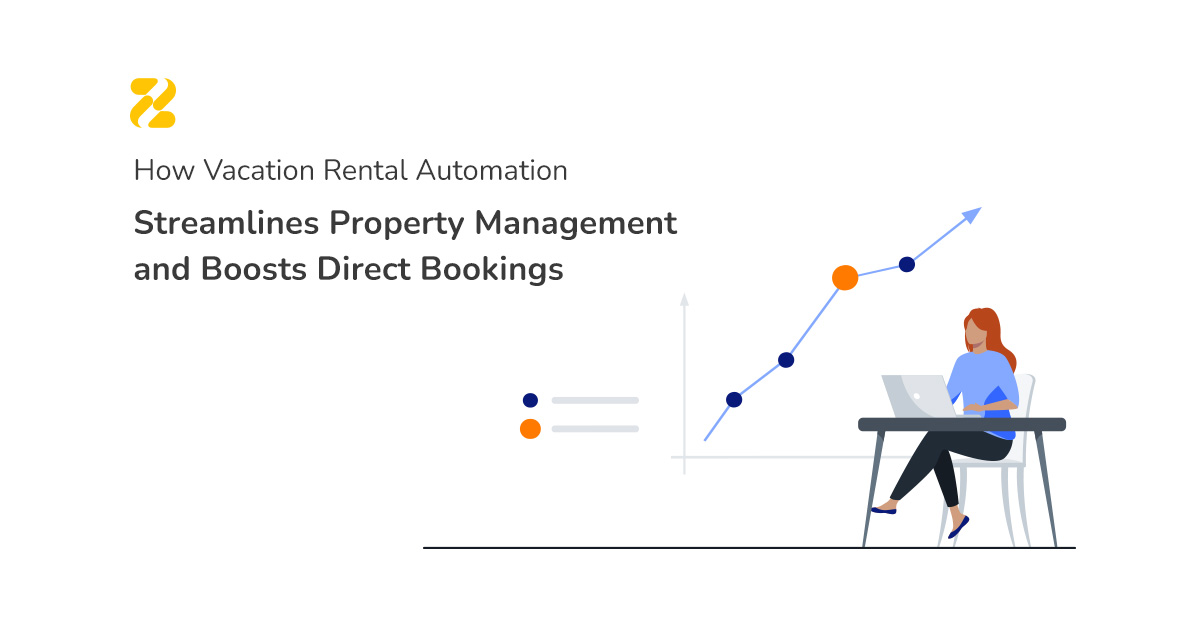Table of Contents
Why You Need a Check-out Procedure for your Rental Property
Check-out procedures for a rental property are crucial for the continued success of a vacation rental business. Short term rental owners and serviced apartment managers are frequently so engrossed in pre-booking enquiries, risk-minimisation checks prior to check-in and dealing with issues during a guest’s stay. However, one must not lose sight of the all-important processes that take place after a guest has checked out.
Ensuring that you have a solid checklist of items to take care of upon a guest’s departure will ensure that you reduce your admin tasks in the long run. Moreover, it can also help safeguard the financial health of your business. This is done by ensuring that everything ties up as it should and your property is ready to provide an excellent stay for the next guest. So what do you need to take care of following a booking? Below is a list of crucial items that you must by no means miss out on.
What a Good Check-out Procedure Should Include to Safeguard your Rental Property
1. Check-out Report For Short Term Rental Homes
One of the key players in the success of a vacation rental business is the housekeeper. This is not only because they are preparing the product that you are ultimately selling to your guests. While that constitutes a large part of what housekeepers do, and while cleanliness and presentation themselves carry huge intrinsic value, there’s more to it.
Frequently, Airbnb hosts who are remotely managing their properties will delegate a lot more responsibilities to housekeepers. The one that probably bears the most weight is ensuring that the property is left in a good condition following check-out. A formal check-out report is frequently seen as too time consuming. Many hosts count on their housekeepers to report any issues found at the property at the point of departure. You may take care of this yourself, outsource it to your housekeeper or ask a property manager to conduct checks following departure. In either case, it is essential that someone thoroughly checks the property and reports any issues found. Your PMS may not offer a feature to help manage this aspect. If so, you may wish to take a look at an app such as Properly or Turno.
So your colleague informs you that the guest is late. Moreover, they tell you that they found a broken vase which someone clearly smashed in a rage with their partner. So now what? Suffice it to say it’s no good if they tell you about this a week following departure. And by no means do you want to have your next guest yelling at you for finding a fault at the property.
2. Handle Security Deposits to Ensure Your Account for Damage
This scenario is of course inconvenient, however, it need not pose a massive issue. Just make sure to pick up on it on time and can charge the booking’s security deposit. By receiving a report immediately following check-out, you are in the best position possible to deal with it. You can charge against a previously pre-authorised deposit if you hold one. Alternatively, you can try to charge a stored card. If you do, make sure this is covered in the rental agreement that your guest signed prior to entry.
If the security deposit was not held directly by yourself but rather through a channel, timing can be even more crucial. Airbnb previously allowed hosts to claim on the Host Guarantee scheme up to 48 hours from check-out. Unfortunately, this no longer holds. A few years back Airbnb introduced an even more stringent rule. This requires hosts to put a claim in prior to the next guest checking in.
Hence, following check-out you may receive a report of an issue that you need to charge for. This could be damage, breaking of house rules or a late departure. In either case, it is of crucial importance to act off the back of it on the spot.
3. Check Payments as Part of your Property Letting Check-out Process
Once you have made sure that you have dealt with any unexpected surprises, it’s time to get on with the rest. In many cases, you may collect payment in full at the time of booking, or at least prior to arrival. In the case of some vacation rental listing sites, you will receive payment shortly after check-in. While you expect whoever dealt with the check-in to hand keys over without payment being made in full, it never hurts to double check.
However, in some more complex scenarios, you may not yet have received all the funds for the booking by the time the guest leaves. For example, this could happen if you have a repeat corporate client for your serviced apartment business. Not infrequently, you may agree on special payment terms where part of the payment is due post check-out. In such cases, it becomes even more important to ensure that this is kept track of and collected when due.
You may also wish to make a note of how much you have earned from that booking. If you use pen and paper, you will need to ensure this is done meticulously. Even should you use a PMS that is not highly reliable, you may wish to check that the figure tallies up with the channel.
4. Log Expenses Relating to the Property Rental in Your Check-out Procedure
Now that you have taken care of your income, it’s time to cast an eye on expenses. Most bookings will come with some related costs. These typically include a sales commission paid to the website or agency where the guest made the booking. If the guest paid by card, they will also include transaction costs in the form of card processing fees.
Moreover, you may want to keep track of a certain expense related to that specific booking. By checking your expenses as well as your incomes at the point of finalising every booking, you save yourself hassle at the end of the month. This holds true especially if you need to produce owner statements for the vacation rental properties that you manage.
5. Issue Invoices to Guests and Tie it All Up
The final step in your check-out procedure for your rental property business is issuing the invoice. This may well come as a surprise to you. Surely, you should issue the invoice at the time the guest books? Guests often ask for an invoice prior to check-in. However, doing so can’t possibly be the right decision to take. This holds especially true if you manage multiple properties.
Bookings are subject to change. For example, the guest may need to change the dates of their stay. Alternatively, you may need to move them to another unit. In the most extreme case, you may actually need to split their stay. Say a guest checks in to a unit, and two days later there’s a leak. If you move them to the apartment next door, you may be a pickle. If you were arbitraging one unit but manage the other one for an owner, you’ll have to reissue two invoices. Thus, while you may issue Pro-forma invoices earlier on in the process, you should hold off with issuing the final invoice. You should only do this once you have taken care of the above points.
A good Property Management System or Channel Manager will allow you to automate the sending of the invoice to the guest at this point. This will avoid them having to ask for it, and you’re having to send it manually.
Other Tips to Bear in Mind Post Guest Departure
The above is a fairly water-tight list of procedures to take care of upon guests checking out from your rental property. However, it is not an exhaustive list of everything you should do once a guest has left. Below are two further top tips that will help your business grow.
Collect Feedback To Further Optimise Your Procedures
Everyone loves a great review. However, getting to a point where they flow in is not easy. You need to continually revise your process to be able to make it to that point. It is therefore very important to adopt a learning attitude as a host. You should appreciate every opportunity to collect feedback and make the most of it.
As such, you may wish to contact guests shortly after their departure in this regard. Besides asking them to leave a review on Google for your property, you may also wish to ask what you can improve on. Sometimes small changes can go a long way in providing guests with a more comfortable stay. The fact that you are reaching out to help them have a stay will also make it less likely for an upset guest to rant about you in public.
Remarket Directly to Get Repeat Bookings
Now that you’ve wrapped up this booking, it’s time to prepare the guest for their next stay with you. Ideally, you should collect the guest’s real email address prior to check-in, or at least before they leave. Given the recent legislation passed in the European Union, you also need to ensure that you collect marketing consent. This applies even if you are based in the US or elsewhere in the world in case your guest comes from the EU.
Assuming you have taken care of both these points, you are now in an excellent position to add the guest to your direct booking marketing database and remarket to them on an ongoing basis. This will help keep your brand’s name at the front of their mind. Ultimately, it means they are more likely to come back to you for another positive experience.
How to Ensure Your Rental Property Check-out Procedure is Followed
Hopefully the above has given you a clear idea of what your check-out process should entail. As a large vacation rental company, you may, at times, struggle with staff following processes you set. Besides training, it is also crucially important to ensure that you have a system that helps you coordinate the workflow. As a team grows, it becomes easy for things to fall through the cracks and good software can be your best friend in minimising human error. Zeevou’s recently-released departure management feature is the only solution on the market that covers this in full. To find out more about how Zeevou can help you automate your short term rental business, you can book a free one: one demo by clicking here.




